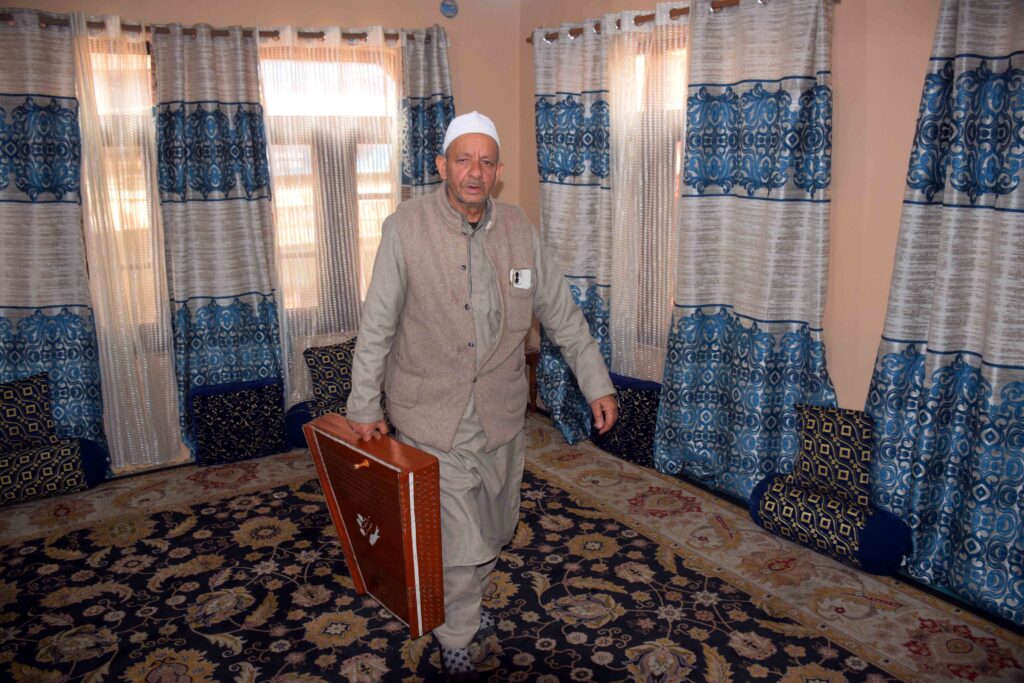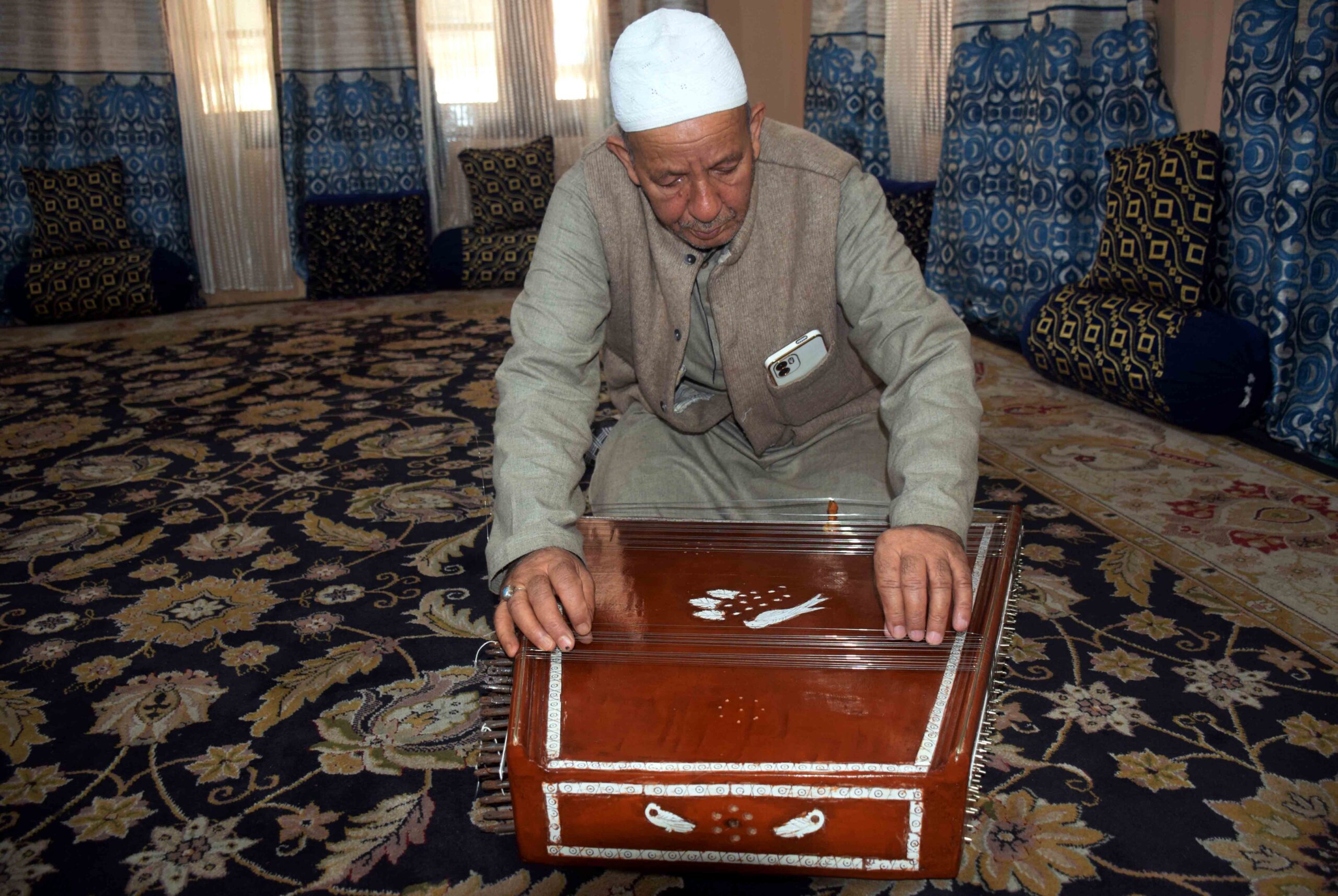In the heart of Srinagar’s old city, an octogenarian is keeping alive the tradition of handcrafting stringed musical instruments, a craft that has been passed down through his family for eight generations. Gh Mohammad Zaz is the last craftsman in his family, and he has been making Kashmiri Santoor, Rabab, Kashmiri Sitar, Sarangi, and other unique instruments for over seven decades. Recently, Zaz was conferred with the Padma Shri award, a recognition of his remarkable contribution to preserving this art form.
By Jahangeer Ganaie
Amidst the bustling streets of the old city in Srinagar, there is an elderly man who is keeping a legacy alive – that of handcrafting stringed musical instruments. Gh Mohammad Zaz, an octogenarian hailing from the Zainakadal Siraj Bagh area of Srinagar, has dedicated his life to this art form for almost seven decades now. He is the last craftsman in his family, and he recently received the prestigious Padma Shri award in recognition of his remarkable contribution to this age-old tradition. The Master Craftsman of Kashmir
Zaz’s journey began at the tender age of 12 when he started learning the art of making musical instruments from his grandfather, father, and uncle, who were all associated with this craft. He fondly reminisces about those days and how his illness from typhoid became the turning point in his life. It was then that one of his acquaintances suggested to his grandfather to train him in the craft. With a passion for the art already running in his veins, Zaz quickly picked up the skills and techniques, which have stayed with him throughout his life.

“At the age of 12, Zaz fell gravely ill with typhoid, and it was during this time that one of his acquaintances suggested to his grandfather to introduce him to the art of crafting musical instruments. Despite his weakness, Zaz’s passion for the craft was undeniable, and it didn’t take long for him to master the skills. With a family history spanning eight generations of craftsmen, Zaz is now the last of his family who is associated with this art form. Over the years, he has handcrafted hundreds of exquisite musical instruments, each one a testament to his unwavering dedication to the craft.”
As the last of the eighth generation of his family, Zaz has inherited the legacy of crafting the finest Santoor in the valley, a tradition that his forefathers had upheld for many decades. With a sense of pride and purpose, Zaz has dedicated his life to the craft, vowing to continue making the finest Santoor for as long as he lives. However, he also acknowledges that with his eventual passing, this tradition will come to an end.
“The original Kashmiri Santoor featured a remarkable 100 strings, but with the instrument’s adoption into Indian Classical Music, the number of strings was reduced to 87, with 28 bridges. As a master craftsman, Zaz has meticulously perfected the art of beautifying the Santoor with intricate Shikargah designs (depicting trees and birds) on the top of the instrument and vibrant paper mache designs on every side,” he said
“I take a great care in enhancing the beauty of the Santoor, adorning the instrument with exquisite Shikargah designs that depict the natural world through intricately detailed images of trees and birds. He further embellishes the Santoor with vibrant paper mache designs on every side, resulting in a visually stunning instrument that complements its sonorous and melodic qualities,” he added
The Zaz family’s mastery of the craft extends beyond Kashmiri Santoor, as they are renowned for creating other traditional musical instruments such as Rabab, Kashmiri Sitar, Sarangi, and a host of other unique instruments.
Zaz credits his loyal clientele, including world-renowned musicians such as Shiv Kumar Sharma and Bhajan Sopori, for bringing innovation to the art form and elevating the status of the Santoor to an international level. He explains that the Santoor was originally used in Sufi music and for hymns during group gatherings, where it was played as a tribute to God. However, over time, it found its way into the world of classical music, gaining greater recognition and popularity.
Gh Mohammad Zaz is the last living craftsman of his family’s eight generations, who have been renowned for creating the finest stringed musical instruments in the valley for many decades. Zaz has dedicated his life to handcrafting musical instruments and was recently awarded the prestigious Padma Shri award.
Ghulam Muhammad Zaz is a renowned artist hailing from the picturesque valley of Kashmir, India. He is widely acknowledged for his unparalleled craftsmanship in making hand-crafted traditional musical instruments. He is the last surviving Santoor maker of Kashmir, thus, his contribution to this art form is truly invaluable. On 26th January 2023, the Indian government conferred upon him the prestigious Padma Shri award, which is considered to be the fourth highest civilian award in India, as a mark of recognition for his unparalleled contribution to the world of music.
Born in 1941, at the Zaina Kadal area of Srinagar, Zaz started his tryst with the world of music at a tender age of 12 when he began learning to make traditional Kashmiri musical instruments like Santoor, Rabab, and Sarangi. Since then, there has been no looking back for him, as he devoted his entire life to honing his skills and perfecting the art of making musical instruments. His exquisite creations are a testament to his unwavering passion and commitment towards this art form, which has been handed down to him by his ancestors.
Zaz’s family is famous for creating a wide range of musical instruments, including Rabab, Kashmiri Sitar, Sarangi, and other unique instruments. Shiv Kumar Sharma and Bhajan Sopori, among other great musicians, have recognized and appreciated the newness and excellence that Zaz has brought to the art, taking Kashmiri Santoor to an international level.
As a master craftsman, Zaz has been beautifying Santoor with Shikargah designs (a design of trees and birds) on the top and colorful paper mache designs on every side, making it more appealing and aesthetic. He has also shared his knowledge and expertise with his grandchildren and apprentices.
However, with no one in his family willing to take up this art, Zaz has expressed concerns about its future. “I have three daughters who are well settled, but none of them have shown interest in learning this craft. With my death, this art will come to an end after eight generations,” said Zaz.
Zaz has continued to pursue his passion for the love of the craft. He said, “I am doing it for my own peace, not for interests. The Padma Shri award is a great honour, and I am grateful to the Government for it. It’s God’s grace, and this award is for those who taught me. Seven generations before me in my family have been making these musical instruments.”


Comments are closed.